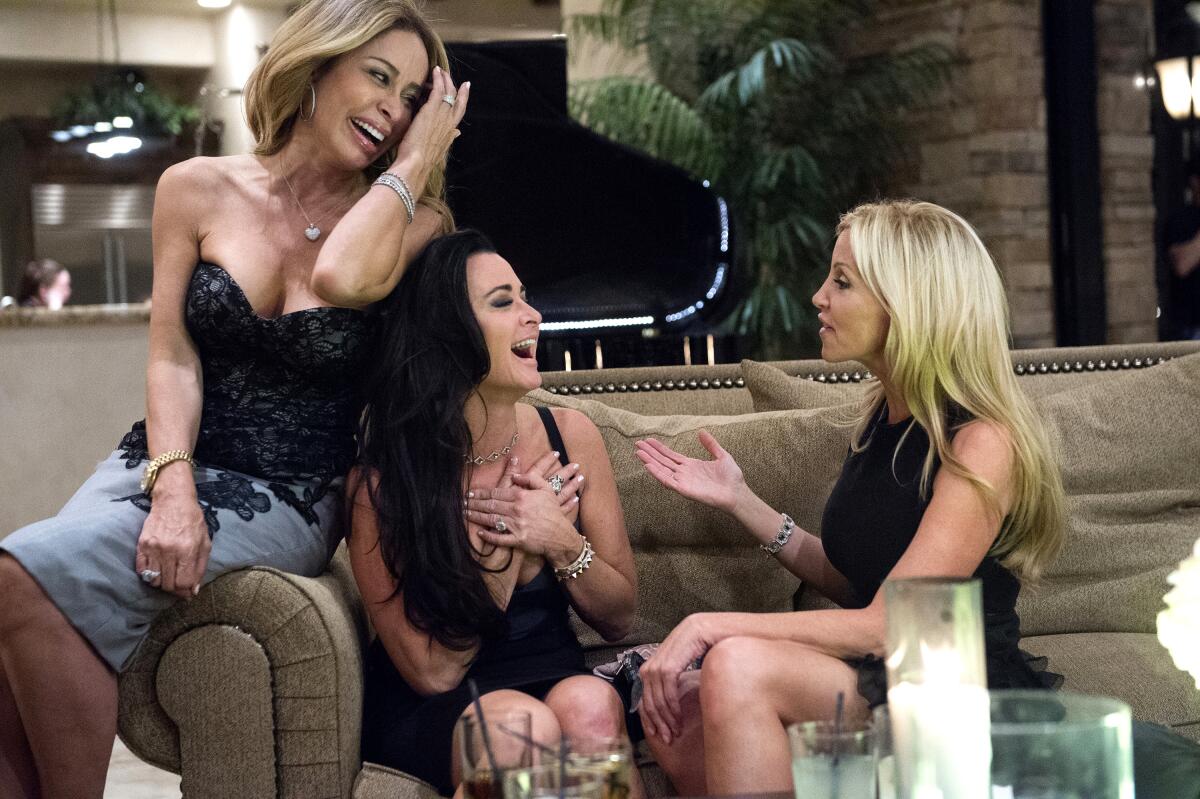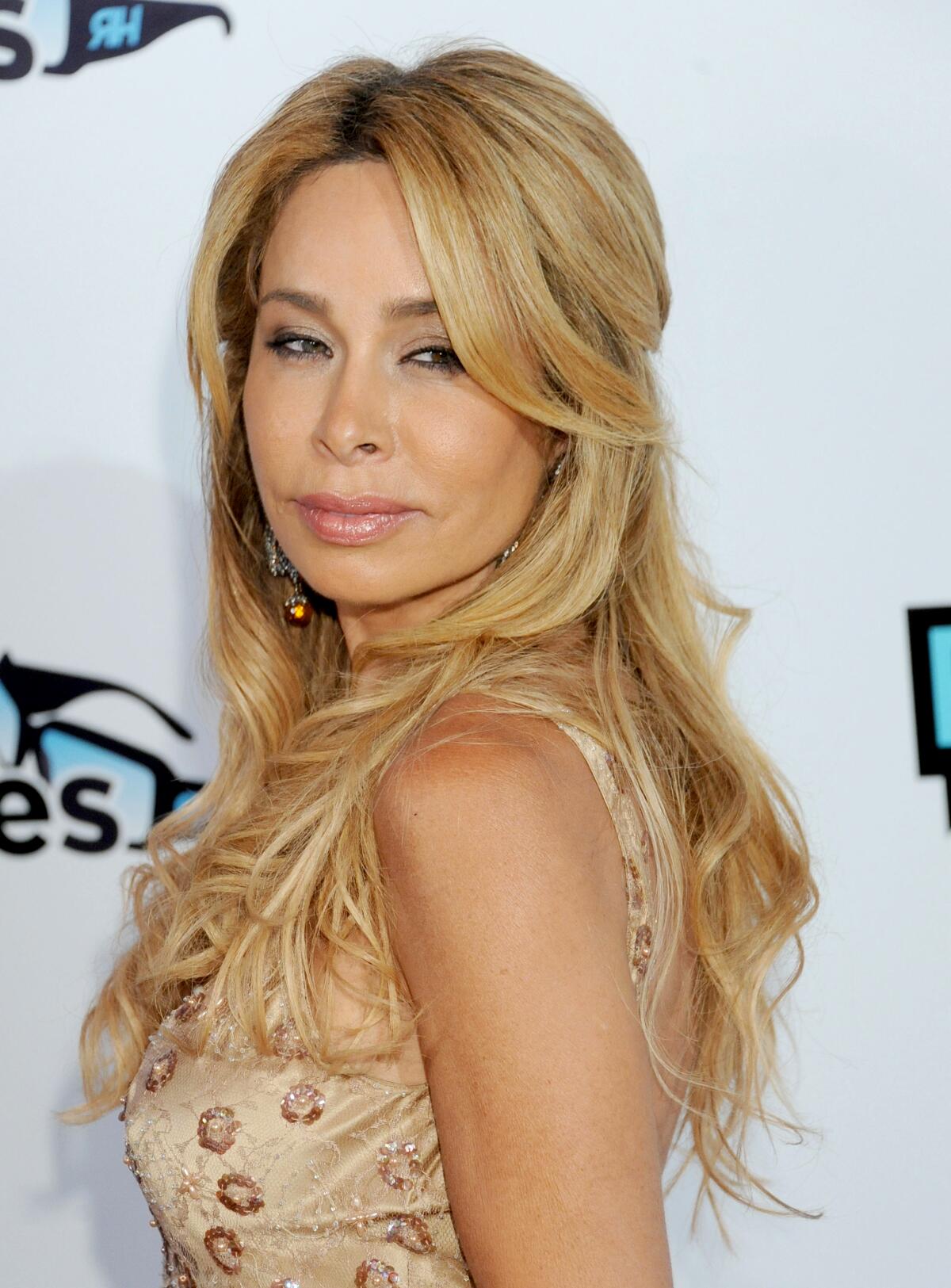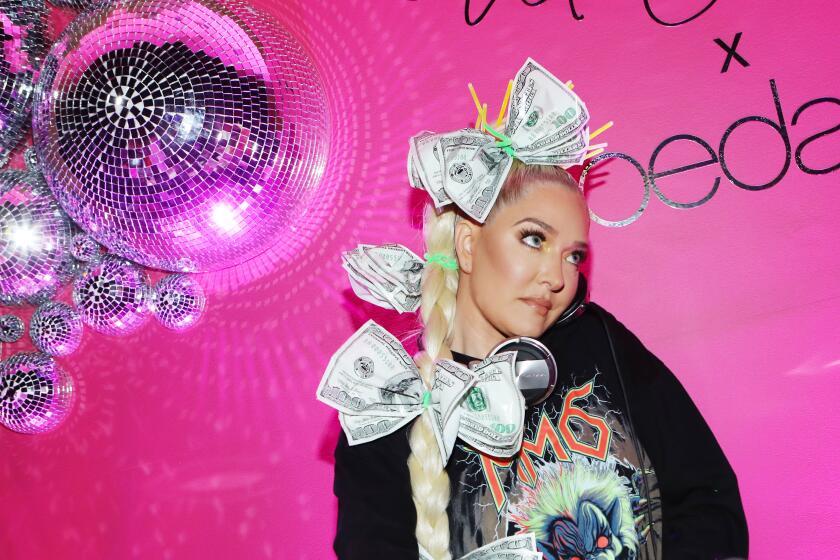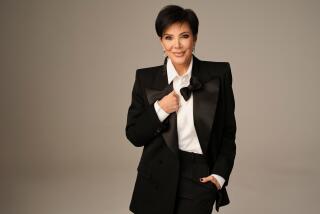Commentary: Faye Resnick was reviled during the O.J. Simpson trial. She’s overdue an apology

When the 11th season of “The Real Housewives of Beverly Hills” premieres Wednesday, there’ll be a new Friend in town: Just as last year’s addition, Sutton Stracke, graduates to diamond-holding Housewife — a jump that only three Housewives have ever made, though many more have been demoted in the other direction — Kathy Hilton makes her debut in the franchise’s distinctive supporting role.
In the “Housewives” universe, the place of Friend is usefully fluid: It allows the series to get the most from a cast member without having to commit fully to their individual storyline (and without the cast member having to commit to filming full-time). While they can play the villain or the comic relief, Friends most commonly act as an ally or sounding board for members of the main cast, making them a key variable in “Housewives’” well-honed reality TV formula.
The bench of supporting players in Beverly Hills has evolved over the series’ 10 seasons to date, but one near-constant presence has been not only an expert Friend on “Housewives,” but also a renowned friend beyond its confines: Faye Resnick. What Judy Greer is to the rom-com, Faye Resnick is to unscripted: not the main character but the devoted friend and confidante who is nonetheless instrumental to the story. Nor has Resnick made a career out of reality television, in the way of many of her castmates. If anything, reality television has made a career out of Resnick: She occupied this world long before the cameras showed up.
The “Housewives” audience first met Resnick in Season 1 at a dinner party that has ascended into reality television infamy, when Camille Grammer — then Kelsey’s wife — menacingly asked the question: “Who is Faye? I know she looks familiar, but I don’t know who Faye is.”
Bankruptcy trustees have accused the reality star of concealing assets for her husband and are dispatching investigators to comb through her belongings and accounts.
She almost certainly knew the answer, as many do, but appeared to feign an epiphany when it occurred to her that she recognized the party guest from her spread in Playboy after the O.J. Simpson trial. “I realized, ‘Oh my God, that’s who it is; it’s Faye Resnick,’” she said. “The morally corrupt Faye Resnick.”
Since entering the public consciousness during the trial of the century as Nicole Brown Simpson’s closest confidante, Resnick has become a reality television staple, in the same peripheral position in genre powerhouses “The Real Housewives of Beverly Hills” (opposite Kyle Richards) and “Keeping Up with the Kardashians” (opposite Kris Jenner) as when we first met her: friend.
In a sense, it’s a role Resnick was born to play. She emerged early in the Simpson saga as a vocal defender of Nicole and adamant about Simpson’s guilt.
Determined to tell Nicole’s story, and with the encouragement of a psychic, Resnick was the first to do what nearly every major player in the Simpson case would: write a book. “Nicole Brown Simpson: A Private Diary of a Life Interrupted” was published just four months after the murder and proved incendiary enough to halt jury selection. Though a loving portrayal of Nicole as a “supermom” who suffered horrific abuse, it was the inclusion of what many viewed as tawdry excerpts, like the details of Nicole’s sex life, that dominated the conversation and defined Resnick’s reputation.
While recent projects like “American Crime Story: The People v. O.J. Simpson” have helped rehabilitate prosecutor Marcia Clark’s reputation by confronting the misogyny she was subjected to at the time, Resnick has rarely received a second look.
Despite a few attempts to reconsider her place in American culture, notably in an extended series on the Simpson case from the popular podcast “You’re Wrong About,” perceptions of Resnick remain much the same as they did in the ’90s. While the “Dream Team” used her cocaine addiction to concoct a story about Colombian drug dealers killing Nicole because Resnick supposedly borrowed money from them to open a Starbucks, it was the general outlines of that narrative, fueled by a misogynistic media, that stuck: Resnick was a drug-addicted, greedy sell-out whose version of events couldn’t be trusted. She was, in short, “morally corrupt.”
If money was indeed the driving factor, selling stories to tabloids would have been far more lucrative, according to the book’s publisher at the time. Resnick maintains that she wrote the book, warts and all, as a way to take the power from the defense — to present even the less savory details contextualized through the lens of Nicole’s abuse.
Resnick recognized something in 1994 that the culture has only just begun to catch up to: Victims shouldn’t have to be perfect for us to care about their abuse. She told Larry King in 1996 that she wanted her portrait of Nicole to be an example to survivors of domestic violence that their perceived faults under no circumstances warranted the abuse they faced, no matter what they’d been conditioned to believe. “I had to show that it’s not a woman’s fault for being beaten up,” she said. “No matter what they’ve done, they do not deserve to be beaten up or killed.”
“The Real Housewives of Salt Lake City” adds a novel ingredient — Mormonism — to the usual pettiness, plastic surgery and conspicuous consumption.
Though Resnick was one of few people at the time to center domestic abuse in the story of the Simpson trial, to draw the connection between battery and murder, she unwittingly prophesied the lasting reaction to the book when she told the New York Times what she imagined it would be like if she were called to testify: “It will be like a rape case,” she predicted. “I will be telling the truth, but I’ll be made to look like some entrepreneurial villain before the entire world. I hate everything about it.”
In many ways the trial laid the groundwork for reality television, pre-empting soap operas for real-life drama, and nowhere is this connection clearer than in “Keeping Up with the Kardashians.” Over the years, Resnick has appeared on the show as Kris Jenner’s friend and confidante, a role she’s had since before the trial. Those deep ties were displayed in one appearance as the pair tearfully reminisced about Nicole at one of her favorite restaurants. Resnick provides a shoulder to lean on, like when she assuaged Kris’ fears about dating again post-divorce, but she’s also a sounding board for lighter fare: laughing as the Kardashian matriarch tells her about contrived plots like donating her eggs to a royal family or getting her ashes turned into a diamond.
While the “KUWTK” set is safe terrain, controlled by her friend of 30 years, “RHOBH” is a dicier battlefield. For the show’s entire run, Resnick has breezed in and out as the best friend of stalwart cast member Kyle Richards, ranging from guest to official “Friend.” All the while, she displayed that same devoted loyalty that she had for Nicole when we first met her.
When Kyle encouraged her to keep an open mind about Camille despite hearing about their conflicts, Faye dug in her heels, “But if she’s mean to you, obviously I’m not going to watch her,” she said. “All I know is everybody adores you, you’ve had your friends forever.” The dinner that followed showed that Resnick’s supporting role couldn’t keep her out of the crossfire, with many of the conflicts she’s been involved in relating back to her public beginnings with the O.J. case.

There tends to be twisted hypocrisy in many of the criticisms of Resnick. Moments after the infamous “morally corrupt” moment in which Grammer digs at her for posing in Playboy, another guest casually asks, “Camille, didn’t you do Playboy?”
A similar thing happens in Season 6 when new Housewife Kathryn Edwards (ex-wife of Simpson’s friend Marcus Allen) confronts Resnick over claims in her book that Edwards turned a blind eye to Allen’s alleged affair with Nicole. “She capitalized on a tragedy… I’m sure she loved the limelight, I mean come on, she was having her 15 minutes,” Edwards says in disgust — under the lights of her own “Real Housewives” confessional.
But Resnick shrugs these attacks off, making it clear she has no interest in talking about that horrible time in her life. Though fiercely defensive of her friends, Resnick is barely fazed when people come for her. Instead, she breezes through conflict with a Teflon-like imperviousness that we rarely see on “Housewives,” a show where just the mention of Harry Hamlin can lead to shattered glass and a chokehold. And anytime her resilience surprises you, you remember Resnick is a veteran of 1994. If she can handle that, she can handle Brandi Glanville. Perhaps alone in the annals of reality TV friends, she can handle anything.
More to Read
The complete guide to home viewing
Get Screen Gab for everything about the TV shows and streaming movies everyone’s talking about.
You may occasionally receive promotional content from the Los Angeles Times.







